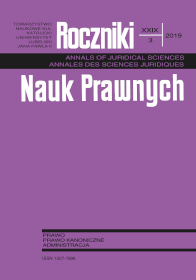Parent’s Personal Interests in the Form of Family and Emotional Relationship with a Child Affected by Parenting Time Inference – the Problem of Monetary Compensation Due to Violation
Abstract
The possibility of qualifying family and emotional relationship as personal interests and giving them the protection by taking account on the facts where parenting time interference occurs intentionally, currently may not cause much controversy in Courts. However, there is a doubt about Courts’ view in the aspect of compensation of a damage caused by that kind of a behaviour through monetary compensation. That is why, the aim of this publication is to analyse relatively poor and rather publicly available judgment of Courts in the context of the issue mentioned above, as well as a dispute with an argumentation from the point of view of the mentioned above way of the compensation of damage. The content of the publication, based on literature and judicature of Courts and The Supreme Court, contains a presentation of a range of the conception of family and emotional relationship between a parent and a child as personal interests, a demarcation of the consequences of deliberate preventing time interference only in the matter of external sphere and its ravages in the matter of inner psychic sphere, analysis of the monetary compensation functions in reference to presented judgements as well as a discussion on subjective and objective criteria determining “the relevant amount” under monetary compensation for nonmaterial damage. Finally, analysis of the judgements allowed to draw interesting conclusions, among which came to the fore ascertainment, that the lack of coherent line in the judgment may cause the situation in which, in fact, there are divergent argumentation.
References
Bosek, Leszek. 2015. „W sprawie kwalifikacji więzi rodzinnej jako dobra osobistego (uwagi krytyczne na tle aktualnego orzecznictwa Sądu Najwyższego).” Forum Prawnicze 29 (3):3-19.
Ignaczewski, Jacek. 2014. „Sprawy o kontakty z dzieckiem i o ich wykonanie.” W Komentarz do spraw rodzinnych, red. Jacek Ignaczewski, 68-165. Warszawa: LexisNexis.
Kopff, Andrzej. 1970. „Glosa do wyroku Sądu Najwyższego z dnia 19 września 1968 roku, sygn. akt II CR 292/68.” Nowe Prawo 7-8:1185.
Kopff, Andrzej. 1982. „Ochrona sfery życia prywatnego w świetle doktryny i orzecznictwa.” Zeszyty Naukowe Uniwersytetu Jagiellońskiego. Prace Prawnicze 100:35.
Krupa-Lipińska, Katarzyna. 2016. „Naruszenie dobra osobistego w postaci więzi rodzinnej poprzez utrudnianie kontaktów z dzieckiem.” W Dobro dziecka w ujęciu interdyscyplinarnym, red. Katarzyna Krupa-Lipińska, 7-26. Toruń: Wydział Prawa i Administracji Uniwersytetu Mikołaja Kopernika w Toruniu.
Księżak, Paweł. 2014. „Komentarz do art. 23-24.” W Kodeks cywilny. Komentarz. Część ogólna, red. Paweł Księżak, i Małgorzata Pyziak-Szafnicka, 267-352. Warszawa: Wolters Kluwer Polska.
Michałowska, Kinga. 2017. Niemajątkowe wartości życia rodzinnego w polskim prawie cywilnym. Warszawa: C.H. Beck.
Panowicz-Lipska, Janina. 1975. Majątkowa ochrona dóbr osobistych. Warszawa: Wydawnictwo Prawnicze.
Pietrzykowski, Henryk. 2014. Metodyka pracy sędziego w sprawach cywilnych. Warszawa: LexisNexis.
Radwański, Zbigniew. 1968. „Glosa do postanowienia Sądu Najwyższego z dnia 18 października 1967 roku, sygn. II CZ 94/67.” Orzecznictwo Sądów Polskich i Komisji Arbitrażowych 208.
Radwański, Zbigniew. 1968. „Roszczenie o zapłatę odpowiedniej sumy pieniężnej na rzecz Polskiego Czerwonego Krzyża w razie umyślnego naruszenia dóbr osobistych.” Ruch Prawniczy Ekonomiczny i Socjologiczny 3:159-70.
Sokołowski, Tomasz. 2012. „Komentarz do art. 24 k.c.” W Kodeks cywilny. Komentarz. Tom I. Część ogólna, red. Andrzej Kidyba, 127-37. Warszawa: Wolters Kluwer Polska.
Szczechowicz, Jarosław. 2012. „Prawne aspekty ochrony dóbr osobistych.” Media – Kultura – Komunikacja Społeczna 8:164-77.
Szpunar, Adam. 2003. „Uwagi o funkcjach odpowiedzialności odszkodowawczej.” Państwo i Prawo 1:17-26.
Telusiewicz, Piotr. 2013. Służebna rola zwrotu „rodzinny” w przepisach prawa polskiego. Lublin: Wydawnictwo KUL.
Wałachowska, Monika. 2007. Zadośćuczynienie pieniężne za doznaną krzywdę. Toruń: Dom Organizatora.
Copyright (c) 2019 Roczniki Nauk Prawnych

This work is licensed under a Creative Commons Attribution-NonCommercial-NoDerivatives 4.0 International License.


